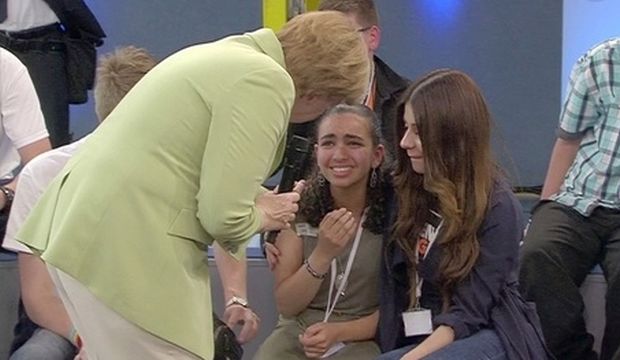Reem Sahwil, the young Palestinian girl who was reduced to tears in front of Angela Merkel, told the German chancellor she didn’t know what her own future held so long as her stay in Europe remained uncertain. In a televised forum, Sahwil spoke of how she would like to go on to college and that it was difficult to watch others make something of their lives while she was not able to due to her status as a refugee.
It was a moment of appeal, a moment history will certainly document.
Who could not have been moved by someone as honest and transparent as 14-year-old Reem as she narrated her and her family’s plight in Germany? Speaking in fluent German, she told Merkel of her fears regarding the possibility of being deporting, before breaking down in tears. Reem, who made news headlines in several German dailies and websites, seemed to represent the face of Europe’s oppressed newcomers.
Within seconds, Merkel, who is seen as a strong woman and who prior to this incident was accused of humiliating the Greek prime minister in negotiations over his country’s financial crisis, found herself in an unenviable position. Reem’s tears embarrassed both Merkel and her government, and the incident raised serious questions about the humanitarian dilemmas facing those fleeing to Europe from the Middle East. This is what actually made German political elites rush to act in order to alter laws concerning refugees.
The incident took place during a show about living in Germany, which Merkel has taken part in before. However, the discussion itself was novel.
For 11 minutes during the forum, Reem explained her story, starting from her early life in Palestinian refugee camps in Lebanon—where complications her mother suffered as she gave birth to her affected Reem’s health and made her incapable of walking normally. She continued to narrate the long and complicated process her parents went through in order to attain a visa to come to Germany for medical treatment five years ago, adding that ever since, they have lived on hopes that Reem will heal and that their asylum application will be approved so they can stay permanently in the country. However, weeks prior to the forum, their application was rejected.
Reem, who seems to have quickly mastered the German language, was most probably excited to attend the forum to narrate her ordeal to Merkel, and this is exactly what happened. However, Reem surely would not have expected that this discussion with Merkel would spark such concern and interest among the German and European public.
The German chancellor failed to comfort the girl, although she did try and pat her on the shoulder. Merkel’s statement that not all those who seek refuge in Germany can stay and that politics is sometimes hard resulted in a wave of reactions against her. The German chancellor was criticized after she responded to Reem’s questions in this manner. It is true that she was frank and clear, but the issue of refugees is not a collective issue but rather one of individuals, where each individual must narrate his or her own story—exactly as Reem did. This wider discussion began to surface in Germany and Europe as the incident went viral and opened people’s eyes to the fears of thousands of refugees who face the threat of forcible deportation.
Reem succeeded in altering the path of her life following the forum as officials there have said she and her family will not be deported after all. But what would have happened if Reem hadn’t cried and we hadn’t seen her moving tears? Someone ended up helping Reem, who really deserves to achieve what she aspires to, but who will help all the other countless, and voiceless, refugees?
Perhaps the discussion and concern resulting from this incident will eventually help give a voice to those refugees who do not have the opportunity to narrate their suffering on television.
